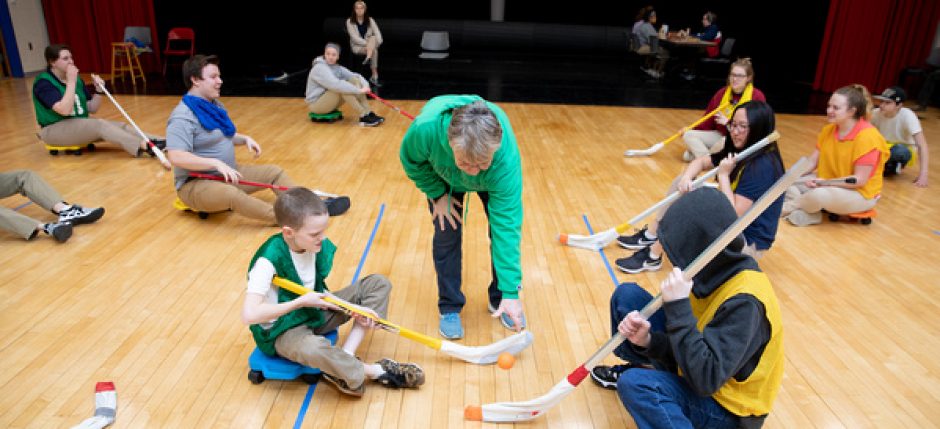In the field of therapeutic recreation, ethically, we are bound to providing the best evidence-based practices currently available to those we serve. Thus, it has become paramount for entry-level practitioners to know how to readily execute and implement the evidence-based practice process. Fortunately, this remote internship gives us a unique opportunity for veteran CTRS’ to work collaboratively with students in doing exactly that. This blog post will step both the mentor and the student through this process and offer resources to explore in order to gain greater understanding.
The evidence-based practice (EBP) process is summarized by Hoffman, Bennett, & DeMar (2010) (as cited in Stumbo, Wolfe, and Pegg, 2017, p. 344) as the 5 A’s:
- Ask the question.
- Access the information.
- Appraise the articles found.
- Apply the information.
- Audit.
In this course, we will implement the first 4 steps of this process.
In the first course project assignment, titled “Project Identification” the student is asked to develop a PICO(T) question/statement based upon the initial analysis assignments (Agency Summary and Market Scan, Population Summary, Program Evaluation) and collaboration with their mentor. An example and instructions for developing a PICO(T) statement can be found under a tab with the same name and on Canvas.
In the second assignment, titled “Literature Review Table”, the student will conduct a search of the scholarly literature using databases from Greenwood Library on the identified topic. The goal is to find the best quality and current information available on that topic. Students will organize information extracted from the articles/sources into a literature review table which will become a quick reference guide for the student and mentor to refer to as the project progresses.
In the third assignment, titled “Literature Summary”, the student will synthesize the information gleaned from the mentor, the clients, and the literature to formulate evidence-based recommendations for next steps. The synthesis a professional document that will summarize and organize all the information and recommendations so that they are coherent and flow.
In the fourth assignment, titled “Expert Opinion & Client Wants/Needs” it is essential that the student reviews the findings from the literature with their mentor. The literature helps guide and direct the CTRS’ actions, and decisions on how to address the PICO(T). However, the literature is only one element of the information required in order to make a truly evidence-based decision. The EBP triangle (ASHA, 2020) requires that CTRS’ take into consideration the needs/wants/interests of the client as well as the expert opinion of the CTRS. In combination, the CTRS will have all the necessary information to make a decision and implement change. Thus, the student will need to discern the expert opinion of the mentor and use whatever information about client needs/wants is available.
Finally, the fourth assignment, titled “Final Project Presentation”, requires that the student organize all the relevant information from the overall project into a PowerPoint presentation. In addition to the information gathered thus far, the student will add a plan to implement the change and explain how the CTRS will measure (audit) whether the change resulted in the desired outcome. This presentation will be given via Zoom and will be treated as though it is being presented at a professional conference.
It is best if project’s focus is on a particular RT intervention for a particular population to address a specific outcome rather than an administrative project such as designing a marketing plan or written plan of operation. However, it is important that the project be mutually beneficial to the agency/CTRS and the student, so administrative projects maybe considered but must be approved by the course instructor.
| Course Project | (Mentor Approval Required) | ||
| Problem/Project Identification | 1, 4, 5 | 6/21/20 | |
| Literature Review Table | 5 | 6/28/20 | |
| Literature Review Summary | 5 | 6/28/20 | |
| Expert Opinion & Client Wants/Needs | 5, 7 | 7/5/20 | |
| Final Project PowerPoint Draft | 1-8 | 7/8/2020 | |
| Final Project PowerPoint Presentation | 7/14/20 | ||
| Final Project Zoom Presentation | 7/17/20 |
References:
American Speech-Hearing-Language Association. (2020). Evidence-based practice. Retrieved on May 14, 2020 at https://www.asha.org/research/ebp/evidence-based-practice/
Stumbo, N.J, Wolfe B.D & Pegg S. (2017). Professional issues in therapeutic recreation: On competence and outcomes. Sagamore Venture Publishing.
